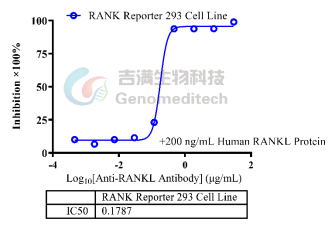Cat. No:GM-77688AB
Product:Anti-H_RANKL hIgG2 Antibody(Denosumab)
Cat. No:GM-77688AB
Product:Anti-H_RANKL hIgG2 Antibody(Denosumab)
GM-77688AB-10 10 μg
GM-77688AB-100 100 μg
GM-77688AB-1000 1mg
Species Reactivity Human
Clone Denosumab
Source/Isotype Monoclonal Human IgG2,κ
Application Block assay
Specificity Detects RANKL
Gene RANKL
Other Names CD254, ODF, OPGL, OPTB2, RANKL, TNLG6B, TRANCE, hRANKL2, sOdf
Gene ID 8600 (human);
Background This gene encodes a member of the tumor necrosis factor (TNF) cytokine family which is a ligand for osteoprotegerin and functions as a key factor for osteoclast differentiation and activation. This protein was shown to be a dentritic cell survival factor and is involved in the regulation of T cell-dependent immune response. T cell activation was reported to induce expression of this gene and lead to an increase of osteoclastogenesis and bone loss. This protein was shown to activate antiapoptotic kinase AKT/PKB through a signaling complex involving SRC kinase and tumor necrosis factor receptor-associated factor (TRAF) 6, which indicated this protein may have a role in the regulation of cell apoptosis. Targeted disruption of the related gene in mice led to severe osteopetrosis and a lack of osteoclasts. The deficient mice exhibited defects in early differentiation of T and B lymphocytes, and failed to form lobulo-alveolar mammary structures during pregnancy. Two alternatively spliced transcript variants have been found.
Storage Store at 2-8℃ short term (1-2 weeks).Store at ≤ -20℃ long term. Avoid repeated freeze-thaw.
Formulation Phosphate-buffered solution, pH 7.2.
Endotoxin < 1 EU/mg, determined by LAL gel clotting assay

Cat. No:GM-77688AB
Product:Anti-H_RANKL hIgG2 Antibody(Denosumab)
GM-77688AB-10 10 μg
GM-77688AB-100 100 μg
GM-77688AB-1000 1mg
Species Reactivity Human
Clone Denosumab
Source/Isotype Monoclonal Human IgG2,κ
Application Block assay
Specificity Detects RANKL
Gene RANKL
Other Names CD254, ODF, OPGL, OPTB2, RANKL, TNLG6B, TRANCE, hRANKL2, sOdf
Gene ID 8600 (human);
Background This gene encodes a member of the tumor necrosis factor (TNF) cytokine family which is a ligand for osteoprotegerin and functions as a key factor for osteoclast differentiation and activation. This protein was shown to be a dentritic cell survival factor and is involved in the regulation of T cell-dependent immune response. T cell activation was reported to induce expression of this gene and lead to an increase of osteoclastogenesis and bone loss. This protein was shown to activate antiapoptotic kinase AKT/PKB through a signaling complex involving SRC kinase and tumor necrosis factor receptor-associated factor (TRAF) 6, which indicated this protein may have a role in the regulation of cell apoptosis. Targeted disruption of the related gene in mice led to severe osteopetrosis and a lack of osteoclasts. The deficient mice exhibited defects in early differentiation of T and B lymphocytes, and failed to form lobulo-alveolar mammary structures during pregnancy. Two alternatively spliced transcript variants have been found.
Storage Store at 2-8℃ short term (1-2 weeks).Store at ≤ -20℃ long term. Avoid repeated freeze-thaw.
Formulation Phosphate-buffered solution, pH 7.2.
Endotoxin < 1 EU/mg, determined by LAL gel clotting assay
